Summer season is officially over, vacations have ended, and school is back in session. Like all transitions, this time can be exciting AND challenging. It means we must “adapt, adjust and accommodate,” as we move from a familiar pattern to a new reality. Yoga teaches us that even in the midst of great upheaval, where everything is different, there is a part of us that remains unchanging. Our practice helps us tap into that unchanging part of ourselves.
As I write this, I am in the midst of my own transition. My role has changed and I have been an active agent in that change. Yet, at the same time, it has been overwhelming and hard to focus. Upon waking, I would look at my emails and start working. When I would break away for my yoga practice, my to do list would practice on the mat next to me and I was distracted. I was tired and self-doubt was on the rise. I found myself wondering if I could step up to the challenge of achieving my own goals. In that moment, I recommitted to my yoga practice. Instead of checking my phone, or emails, or even turning on the wi-fi in the house, I focused on my practice. It became once again the first thing that I do in the morning.
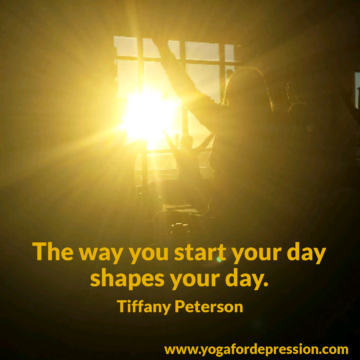 Committing to my own practice first thing is what has made the difference for me, and it underscores the lesson I teach and sometimes need to relearn myself: We begin with commitment to our own Self-care. If your cup is empty, how can you hope to give to others? The morning, before your to-do list kicks in, is the perfect time to fill your cup. Just 10 minutes of a yoga practice can make all the difference in the world. In that 10 minutes, reconnect to the wholeness that lives beneath your changing moods your to-do lists, and your personal preferences. Try a gentle warm up practice, maybe a visualization practice, a breathing practice, meditation, a chant, or you could treat yourself to full yoga practice with Amy Weintraub or Rose Kress. Whatever practice you choose, know that it will sustain you through your day.
Committing to my own practice first thing is what has made the difference for me, and it underscores the lesson I teach and sometimes need to relearn myself: We begin with commitment to our own Self-care. If your cup is empty, how can you hope to give to others? The morning, before your to-do list kicks in, is the perfect time to fill your cup. Just 10 minutes of a yoga practice can make all the difference in the world. In that 10 minutes, reconnect to the wholeness that lives beneath your changing moods your to-do lists, and your personal preferences. Try a gentle warm up practice, maybe a visualization practice, a breathing practice, meditation, a chant, or you could treat yourself to full yoga practice with Amy Weintraub or Rose Kress. Whatever practice you choose, know that it will sustain you through your day.
In this newsletter, we have three research reviews, one on anxiety, one on depression, and one for ulcerative colitis and related mood issues. Alena Gerst reviews Expanding Joy: Let Your Yoga Dance, by Megha Nancy Buttenheim. Rose Kress reviews The Principles and Practice of Yoga in Health Care, Edited by Sat Bir Singh Khalsa, Lorenzo Cohen, Timothy McCall and Shirley Telles. Amy Weintraub discusses Enlightened Negotiation: 8 Universal Laws to Connect, Create, and Prosper by Mehrad Nazari, PhD, MBA.
Namaste and thank you,
Rose Kress
Research: Kripalu Yoga for Anxiety
In a recent case series, to be published in the International Journal of Yoga Therapy, researchers investigated the use of yoga for reducing worry among individuals suffering from Generalized Anxiety Disorder, or GAD. Three participants suffering from GAD received Kripalu Yoga sessions, twice a week for eight weeks. Via standardized self-report measures, assessed pre- and post-intervention, participants reported a reduction of worry, anxiety, experiential avoidance, and an increase in mindfulness. Also noted was an improved heart rate variability, which is the body’s ability to recover from stress.
While the size of the group was small, this represents an initial investigation into the use Kripalu Yoga for mood management. LifeForce Yoga has its roots in Kripalu Yoga; founder Amy Weintraub is certified as a Kripalu Yoga teacher and Mentor at the 500 hour level.
Read the full abstract here.
Research: Mindfulness May Reduce Depression and Stress in Poor Black Women
Poor black women have an increased risk of depression, but are less likely to seek out professional help due to societal stigma, limited access, and economic considerations. This pilot study at Northwestern University sought to provide mindfulness as an alternative, which, along with meditation, includes yoga and a body scanning relaxation exercise similar to yoga nidra. 31 adult women with depressive symptoms participated in the 8-week group intervention using adapted MBSR (Mindfulness Based Stress Reduction) in an urban Federally Qualified Health Center. Depression, as well as stress, mindfulness, well-being, and depression stigma were assessed at baseline, 8 and 16 weeks. Depressive symptoms and stress decreased, while mindfulness and well-being increased as a result of the intervention.
There is a definite need for more structured yoga and meditation protocols in urban areas. Socio-economic constrictions and social stigmas exert a limited access on the disadvantaged. MBSR provides such a tool. LifeForce Yoga offers short interventions that can be practiced at home that support self-efficacy, sel-regulation and reduce the symptoms of depression and stress. One LifeForce Yoga technique that gives the mind a bone is the LifeForce Yoga Chakra Clearing Meditation.
Read more on this study here.
Research: Yoga Improves Quality of Life in Patients with Ulcerative Colitis
Cramer, Langhorst, and colleagues conducted a 12-week yoga intervention for patients with ulcerative colitis, an inflammatory disease of the large intestines. Of 77 participants, 39 were randomly assigned to the yoga group and 38 were assigned to the control group (written self-care lifestyle advice). Follow-up happened at 12 weeks and 24 weeks. After 12 weeks of 90 minute hatha yoga sessions, at only one per week, the yoga group reported better disease-specific quality of life, better physical quality of life, reduction of anxiety and depression, and an increase in self-efficacy. These measures were maintained through the 24-week follow-up.
The yoga intervention mentioned in the study was hatha yoga, which is an emphasis on physical postures with some breathing. A yoga practice of postures is a good daily habit, but not always possible or accessible. Yoga practice also includes breathing, meditation, sound and mudra. For the individual suffering from a debilitating illness, these practices can be done in bed.
Read a write up of the full study here.
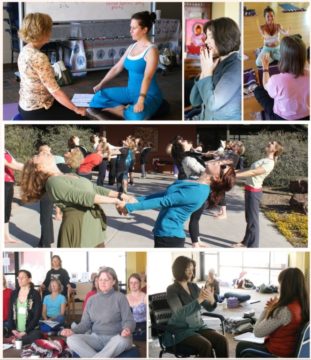 LifeForce Yoga Practitioner Training, Level 1
LifeForce Yoga Practitioner Training, Level 1
Tucson, AZ Open for Registration
Join Amy Weintraub, Rose Kress, and Randy Todd for the annual LifeForce Yoga Training and Retreat in Tucson. In a retreat style setting participants learn yogic techniques and self-care strategies for mood management. Professionals will learn LifeForce Yoga mood management tools to share with clients, students, and groups. Retreatants will learn mood management strategies for when life becomes overwhelming.
Days begin with a led yoga and meditation practice while the sun rises over the Tucson valley. Two 3-hour sessions include discussion, experiential practice, one-on-one practice teaches. During afternoon breaks, explore the desert, get a massage, network with peers, and enjoy daily yoga nidra (deep relaxation) practices.
CEUs for Yoga Teachers and Social Workers
Registration information here. Act now for the Early Bird Price, which expires September 15th.
Book Review:
The Principles and Practice of Yoga in Health Care, Edited by Sat Bir Singh Khalsa, Lorenzo Cohen, Timothy McCall and Shirley Telles
Reviewed by Rose Kress, ERYT-500, YACEP, LFYP2
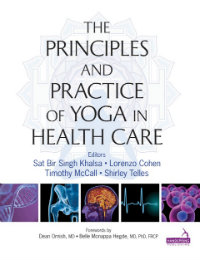 Yoga as a complementary alternative medicine continues to grow. Yoga Therapy is found in cancer centers, pulmonary offices, doctors’ offices, hospitals, inpatient clinics, etc. The Principles and Practice of Yoga in Health Care is a resource/text book for health care professionals and yoga professionals that provides a systemic and comprehensive review of yoga practice and therapy in health care settings. Each section of this book covers a specific issue, separated into chapters followed by clinical insights from a leader in the field. Including an introduction to yoga and yoga therapy, topics covered are: mental health conditions; musculoskeletal and neurological conditions; endocrine conditions; cardiorespiratory conditions; cancer; special populations; and practical and future considerations.
Yoga as a complementary alternative medicine continues to grow. Yoga Therapy is found in cancer centers, pulmonary offices, doctors’ offices, hospitals, inpatient clinics, etc. The Principles and Practice of Yoga in Health Care is a resource/text book for health care professionals and yoga professionals that provides a systemic and comprehensive review of yoga practice and therapy in health care settings. Each section of this book covers a specific issue, separated into chapters followed by clinical insights from a leader in the field. Including an introduction to yoga and yoga therapy, topics covered are: mental health conditions; musculoskeletal and neurological conditions; endocrine conditions; cardiorespiratory conditions; cancer; special populations; and practical and future considerations.
Under each section, chapters provide more in depth information. For instance, the section on mental health conditions has a chapter on depression, one for anxiety, and one for other mental health conditions. Each chapter categorizes and discusses the relevant research studies. For the reader who finds research discussion challenging, there are tables in each chapter that compare the relevant information, like population, design and interventions, outcome, etc, providing a quick review of the research.
The gem of the resource is the clinical insights found at the end of each chapter. The short 3 page insights share a number of practices and insights from leaders in the field and includes images for a supportive posture. Timothy McCall provides clinical insights for the chapter on yoga therapy for depression. He consults Patricia Walden (Iyengar Yoga), Ganesh Mohan (Svasta Yoga), and our own Amy Weintraub (LifeForce Yoga). While these authors are from three different traditions all three agree on the practice and process of working with individuals suffering from depression, like the inclusion of breathing techniques, and tools to focus a mind that tends to ruminate. The clinical insight sections are great for the individual who wants to get right to the practical application for any condition.
This book reads like a text book, which can be daunting for some readers. However, the wealth of knowledge contained within these pages is invaluable. For the professional who needs support in backing up a claim, or directing a client/student to the proper resource, turning to the appropriate chapter provides the proper information. Individuals looking for direction in practice can also use this book. This compendium is invaluable for the health professional who recommends and/or uses yoga as a part of his/her practice. This book also belongs on the shelf of any yoga therapist.
Order your copy here.
Reviewed by Rose Kress, ERYT-500, LFYP-2, YACEP, Director of LifeForce Yoga
 Rose began practicing yoga in 1994 and teaching since 2004. In that time she has focused on the therapeutic aspects of yoga – for the body, mind and soul. Rose teaches classes and workshops throughout the Tucson area and has been blessed to teach at The Crossings in Austin, TX, at Yogaville in VA, at Kripalu in Lenox, MA, and Sivananda Ashram in The Bahamas with the LifeForce Yoga Practitioner Training Program. She has also presented at a number of Yoga Festivals in Arizona. Rose integrates LifeForce Yoga techniques into therapeutic yoga for back pain, cancer, pulmonary disease, structural wellness, and yoga therapy. She studies with Rama Jyoti Vernon and has taken the Functional Yoga Therapy Training with Maria KaliMa. Rose is the Director of the LifeForce Yoga Healing Institute and teaches in the LifeForce Yoga Practitioner Trainings. Rose is also the author of 2 CDs, Mantra Chanting with Rose and Pathways to Relaxation.
Rose began practicing yoga in 1994 and teaching since 2004. In that time she has focused on the therapeutic aspects of yoga – for the body, mind and soul. Rose teaches classes and workshops throughout the Tucson area and has been blessed to teach at The Crossings in Austin, TX, at Yogaville in VA, at Kripalu in Lenox, MA, and Sivananda Ashram in The Bahamas with the LifeForce Yoga Practitioner Training Program. She has also presented at a number of Yoga Festivals in Arizona. Rose integrates LifeForce Yoga techniques into therapeutic yoga for back pain, cancer, pulmonary disease, structural wellness, and yoga therapy. She studies with Rama Jyoti Vernon and has taken the Functional Yoga Therapy Training with Maria KaliMa. Rose is the Director of the LifeForce Yoga Healing Institute and teaches in the LifeForce Yoga Practitioner Trainings. Rose is also the author of 2 CDs, Mantra Chanting with Rose and Pathways to Relaxation.
Book Review:
Expanding Joy: Let Your Yoga Dance, by Megha Nancy Buttenheim
Reviewed by Alena Gerst, LCSW, RYT, LFYP1
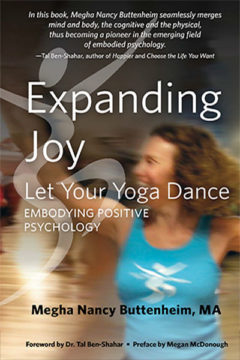 It looks like a small paperback, a quick read. Think of a handbook about doing yoga to music, and calling the practice Yoga Dance. Now think again. This book, by Megha Nancy Buttenheim, founder of Let Your Yoga Dance: Grace in Motion, has everything to do with yoga and dance, but its title is far more encompassing of the subject matter: Expanding Joy: Let Your Yoga Dance.
It looks like a small paperback, a quick read. Think of a handbook about doing yoga to music, and calling the practice Yoga Dance. Now think again. This book, by Megha Nancy Buttenheim, founder of Let Your Yoga Dance: Grace in Motion, has everything to do with yoga and dance, but its title is far more encompassing of the subject matter: Expanding Joy: Let Your Yoga Dance.
And what exactly is Let Your Yoga Dance (LYYD)? Megha calls it, “a moving celebration of spirit.” Her mission: “To spread joy and consciousness throughout the world by transmitting body health, brain health, heart health, and soul health to all populations.”
So much more than a book, and unlike anything you have ever read before, it is more like a walk through nature. Just as you would walk along the beach and stop to listen to the waves and examine a seashell. Or as you would stroll through a forest, pausing to hear the breeze in the trees or smell the dirt blanketing the earth. Or on a hike through the desert, when you are distracted by a lizard you want to follow for a little bit, and the sun shines so brightly you are moved to rest and soak it in. That is akin to the experience of “reading” this book.
I will explain the specifics momentarily. But you should know right away that it’s not just a book. You read a little, then you move a little to short videos led by Megha herself. You read some more and then you’re watching a TED talk by a Positive Psychology thought leader. You read on, and then you’re taking an online quiz to determine your top character strengths. A few more pages, and then listen to a song Megha recommends that is relevant to the writing.
The most important part of the book, ironically, is not actually in the book at all, but sections Megha calls the Takeaways. These are 14 short (about 2 minute) video-led experiences she has created to supplement the reading. When you purchase the book, you will be provided with information so you can access the videos. Some tasks are designed to build energy, and some are intended to provide calm, depending on the topic she is addressing.
“In this book,” she writes, “you’ll be asked occasionally to push the Pause button on your reading experience,” resulting in “more energy and focus, and a much happier, alert mind and body.” This is her way of saying the book requires not just a reader, but a willing participant. It is a cerebral, visceral, and physical undertaking, accessible I must add, to anyone, regardless of physical abilities.
You don’t have to do all of these things, of course. But Megha is a masterful teacher. She quotes Amrit Desai, the founder of the yoga and healing retreat Kripalu, when she writes, “I haven’t come to teach you, but to love you, and the love alone will teach you.”
Her knowledge is steeped in the evidence of Positive Psychology, the physiological truths of the benefits of movement and breath, combined with the ancient teachings of Yoga.
After outlining specifically what LYYD is, Megha goes on to incorporate the chakras and the Yamas and Niyamas, or the Yogic codes of conduct. She continues to weave Positive Psychology into the tapestry of LYYD, and the SPIRE teachings of Positive Psychology, which embodies the Spiritual, Physical, Intellectual, Relational, and the Emotional.
While she makes the case that her LYYD movement practice is a great work-out, it’s an even better “play-in.” The goal of LYYD can be whatever you want it to be: physical fitness, mental clarity, spiritual comfort, emotional healing. But the most inspiring thing about the book Megha conveys is that she remains, above all else, someone who understands firsthand the profound healing properties of movement and play.
At the end of the book she shares her deepest sorrow, the death of her baby girl, who was born still. Her healing process from that loss is what led her to develop Grace in Motion, i.e. Let Your Yoga Dance. “We don’t have to work or struggle for Grace…But sometimes it can wrap itself around us like a soft, tender blanket.”
Megha writes from her heart. With this book, you will learn new information on the latest psychological breakthroughs and how they align with ancient teachings and traditions. But more than that, you will likely feel as though you have been loved in the way only a teacher can love a student.
I imagine that someday, should I have the good fortune to take a class with Megha in person, I will have a sensation of coming home. Home being that place we all hold in our hearts, where we imagine the ultimate comfort, nurturing, and peace. For Megha, “I dance through life with Grace and ease. It reminds me,” she writes, “of all I aspire to.” What do you aspire to? Get this book, and find out.
Order your copy here.
 Reviewed by Alena Gerst, LCSW, RYT, LFYP-1
Reviewed by Alena Gerst, LCSW, RYT, LFYP-1
Alena blends her training as a licensed clinical social worker and yoga teacher in hospitals and in private practice. She completed therapeutic yoga training at Mt. Sinai Beth Israel Medical Center’s Department of Integrative Medicine, and is a certified LifeForce Yoga Practitioner Level 1. She provides outpatient psychotherapy for women with disabilities at NYU Langone Medical Center/Hospital for Joint Diseases, and is the author of A Wellness Handbook for the Performing Artist: The Performer’s Essential Guide to Staying Healthy in Body, Mind, and Spirit (Balboa Press, Hay House). She also provides recurring interviews with Dr. Nieca Goldberg on Serius XM Doctor Radio about women’s health. Her yoga practice is inspired by the teachings of B.K.S. Iyengar. She lives in New York City.
Media Mention:
Enlightened Negotiation: 8 Universal Laws to Connect, Create, and Prosper by Mehrad Nazari, PhD, MBA
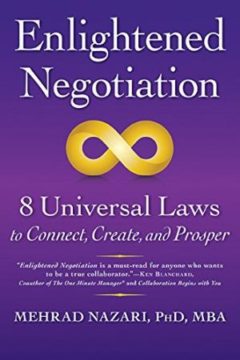 Dr. Mehrad Nazari’s many years of teaching negotiations, his background in business and real estate, and his deep understanding of spiritual psychology gives this book a unique foundation. Nazari’s approach is not the typical “win-win.” Something larger is at stake. That bigger picture is based on conscious self-awareness. In other words, it’s important to know yourself. Enlightened Negotiation helps you determine your comfortable style of negotiation. When you act from that self-awareness, your negotiation, whether it be in business or with your beloved, is more likely to create a sense of connectedness and prosperity for the participants. Following the 8 Universal Laws outlined in this book, can help you negotiate contracts or domestic matters with family members, so that all parties feel acknowledged, respected and satisfied with the outcome. Nazari is a well-respected yoga and meditation teacher, and the wisdom of oneness and of love is at the foundation of his approach to negotiation. If that seems strange, especially in business, the many anecdotes of behavior change and successful negotiations will help you understand what may be possible in those gnarly places of impasse in your own life. This is yoga applied to real life.
Dr. Mehrad Nazari’s many years of teaching negotiations, his background in business and real estate, and his deep understanding of spiritual psychology gives this book a unique foundation. Nazari’s approach is not the typical “win-win.” Something larger is at stake. That bigger picture is based on conscious self-awareness. In other words, it’s important to know yourself. Enlightened Negotiation helps you determine your comfortable style of negotiation. When you act from that self-awareness, your negotiation, whether it be in business or with your beloved, is more likely to create a sense of connectedness and prosperity for the participants. Following the 8 Universal Laws outlined in this book, can help you negotiate contracts or domestic matters with family members, so that all parties feel acknowledged, respected and satisfied with the outcome. Nazari is a well-respected yoga and meditation teacher, and the wisdom of oneness and of love is at the foundation of his approach to negotiation. If that seems strange, especially in business, the many anecdotes of behavior change and successful negotiations will help you understand what may be possible in those gnarly places of impasse in your own life. This is yoga applied to real life.
